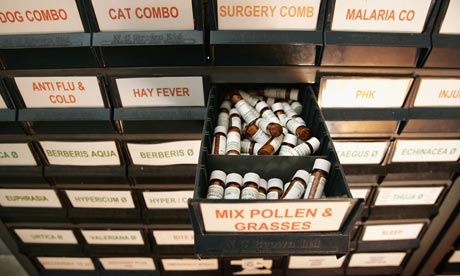
Should homeopathy be available on the NHS? Absolutely – it's possibly the safest, most ethical and most effective placebo there is. Where money is truly wasted is in trying to find evidence that homeopathy works.
If you think that what passes for homeopathy today can be properly assessed by modern science, it should only take a visit to a homeopathic pharmacy to change your mind. As part of my research for my book 13 Things That Don't Make Sense, I did just that. On the shelves I found remedies made from "F sharp minor", "Gog and Magog, Oaks at Glastonbury", "Flapjack" and "Crop Circle".
Also stored somewhere at that pharmacy - I didn't see it, but I had read about it - was a homeopathic remedy made from the blood of an HIV positive man. There were remedies made from more conventional substances too, plants that any herbalist might use. But where do you draw the line when trying to assess this field? Whatever you do, there is going to be a hell of a lot of noise in the data.
The same is true for the legions of people who say homeopathy works for them. During my research I came across perfectly sane people whose initial scepticism had been blown away after their reluctant use of homeopathic treatments was followed by dramatic improvements in their symptoms. But anecdote, however impassioned, is not scientific evidence – there are always too many unknowns behind each success story.
Having said all that, you might think that I'm against homeopathic treatments being funded on the NHS. I would certainly agree with the vast majority of scientists who say that homeopathy is almost certainly no more effective than placebo. But there are two qualifications I should make about that statement – and they make all the difference.
The first qualification is that the claim homeopathy doesn't work is a prejudice, not a scientifically proven fact. The second qualification is much more important. I don't actually know what "no more effective than placebo" means. And neither does anyone else.
In fact, the phrase's negative connotations are undeserved. Let's not forget that placebos are medically useful, and doctors know it. Let me give you some figures to support that heresy.
In 2003, a survey found that 48% of Danish GPs use what they regarded as a placebo intervention – mostly antibiotics for viral infections or vitamins for unspecified fatigue – 10 or more times per year. A 2004 study of Israeli doctors, published in the British Medical Journal, found that 60% had prescribed placebos. Of those, around two-thirds did so once a month or more, and lied to the patient about the "medication". Some 94% of these doctors found placebos to be an effective means of treatment.
Roughly half of US physicians admit to regularly prescribing placebo – usually vitamins or analgesics – in their clinical practice, and believe this to be ethical. The American Medical Association has advised doctors that it's OK to use placebos if they can avoid the deception that tends to go with it.
Homeopathy is perfect for this. In fact, its consultation process, combined with the homeopath's and the patient's faith in it, can make it an extremely powerful placebo.
The placebo effect, you see, kicks in on a sliding scale. Last year, a Harvard Medical School study compared the efficacy of various methods of consulting with patients suffering from irritable bowel syndrome (IBS).
It found that patients given "extreme placebo" – basically, they were listened to at length, and fully consulted about their symptoms, feelings and treatments – reported an improvement that was equivalent to that achieved by drugs commonly used to treat IBS. The irony is that, in order to be licensed, those drugs would have had to performed "better than placebo" in standard clinical trials.
Giving a placebo is not the same as doing nothing, which means that sometimes prescribing a placebo is better than doing nothing. People are not biochemical versions of computer programs, where a particular input will give a particular output. Being a doctor isn't about being handcuffed by evidence-based medicine, it's about using skilled judgement in tandem with the best available evidence – including evidence about the efficacy of placebos.
Perhaps it's time to restate that medicine should be considered an art, not a science.
Using placebos effectively is difficult, however. Regulations governing cost and evidence-based prescribing prevent a pharmacy from dispensing something recognised as a placebo. Curiously, the Americans are ahead of us here, too. A 2001 article in the Journal of the American Pharmaceutical Association provides a script for the pharmacist's role in the deception which neatly deflects any responsibility. Realising that a doctor has prescribed a placebo, the pharmacist should deliver the medication with these words: "Generally, a larger dose is used for most patients, but your doctor believes that you'll benefit from this dose."
With homeopathy, that problem is side-stepped. Homeopaths tend to believe in what they are doing, so there's no deception – and their conviction reinforces the placebo effect. It costs money, but so do IBS drugs, which are no more effective.
And even opponents of homeopathy must concede that, if the remedies are essentially nothing more than water or lactose pills, adverse side effects are pretty unlikely.
So, yes, I think doctors should be allowed to refer patients to small homeopathic practices, with fee caps, if the doctor believes a placebo is the best course of action. I would point out, though, that even placebos can be taken too far. I'm not keen on funding hugely costly "homeopathic hospitals", for example. To me, they just seem silly.
Michael Brooks is a consultant for New Scientist and the author of 13 Things That Don't Make Sense. You can hear Michael discuss his book in next week's Science Weekly podcast

